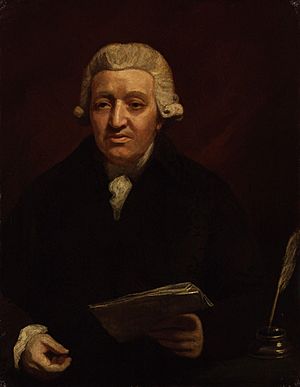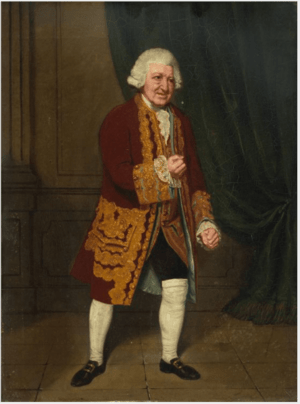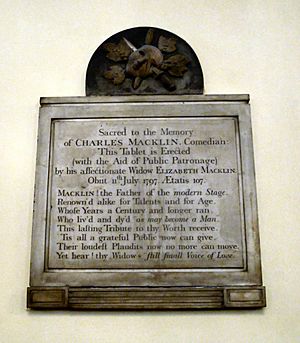Charles Macklin facts for kids
Charles Macklin (born 26 September 1699 – died 11 July 1797) was a famous Irish actor and writer for the stage. He performed a lot at the Theatre Royal, Drury Lane in London. Macklin changed acting in the 1700s by bringing in a "natural style" of performing. This was very different from the usual way actors spoke and moved back then. He is also known for accidentally causing the death of another actor during an argument over a wig at the same theatre.
Macklin was born in County Donegal, Ireland, and grew up in Dublin. He went to school in Islandbridge after his father passed away and his mother remarried. Charles Macklin became well-known for his many roles in both sad plays (tragedies) and funny plays (comedies). His most famous role was playing Shylock in The Merchant of Venice. Macklin had a very long career, which often involved disagreements, before he died at the age of 97.
Contents
Early Life of Charles Macklin
Charles Macklin was probably born near Culdaff in County Donegal, Ireland, around 1699. He moved to Great Britain sometime between 1725 and 1726. When he died, people thought he was 97 years old, which matches his own words that he was born "in the last year of the last century."
His family's original name was McLaughlin, but he changed it to Macklin for the English stage because he felt McLaughlin was hard for English speakers to say. He worked as an actor in London, but his Irish accent made it hard for him to find steady work at first. However, he got noticed in a small role in a play called Coffee-House Politician in 1725. After this, he was hired by the Theatre Royal, Drury Lane as an actor and a manager. He worked with another actor named James Quin, but they often disagreed. Macklin said they only worked together because they had to.
Charles Macklin's Famous Roles
Macklin's most important role was Shylock in The Merchant of Venice, which he first played on 14 February 1741. Before Macklin, Shylock was often played as a funny character. But Macklin wanted to play him differently.
Macklin studied old books and even talked to Italian Jews to understand how they looked and spoke. He learned that Jews from Venice often wore red hats, so he wore one for his costume. By doing this, Macklin helped start the idea of making costumes historically accurate, which became very important in acting later on.
When Macklin played Shylock, he made the character serious and villainous, not funny. The audience loved it! Macklin said that after the play, many important people and critics praised him. Even King George II saw the play and was so impressed he couldn't sleep that night.
Many actors tried to play Shylock like Macklin, but none were as successful. Macklin played Shylock for almost 50 years. He also played other important roles like Iago in Othello and the Ghost in Hamlet. He also created a famous funny character called Sir Pertinax Macsycophant. In 1772, he played Macbeth in a play that used real Scottish costumes.
Macklin and his student, David Garrick, changed acting in the 1700s. However, Macklin and Garrick had a disagreement in the 1740s. This argument slowed down Macklin's career but helped Garrick's career take off. Macklin felt let down by Garrick and the other actors.
Macklin also acted often in Dublin, Ireland, at theatres like the Aunger Street and Smock Alley Theatres. He even started his own theatre, the Crow Street Theatre, in 1758.
Charles Macklin as a Playwright
Macklin also wrote many plays. Some of his well-known plays include Love a la Mode (1759) and The Man of the World (1781). His play The True-Born Irishman (1763) was very popular in Ireland. However, when it was performed in England, it was not a success. Macklin realized that humor can be different in different places.
A New Way of Acting
Charles Macklin changed acting in the 1700s by introducing a "natural style" of performing. Before him, most actors used a very dramatic and formal way of speaking, almost like they were giving a speech. They would often stand in fixed positions and talk directly to the audience.
Macklin believed that acting should be more like real life. He wanted actors to sound and move like people do every day. He also thought actors should know their roles very well and pay attention to what was happening in the scene.
How Macklin Taught Acting
Macklin thought acting was a science based on nature. He often told his students to forget everything they had learned about acting before. He was a very dedicated teacher and would sometimes teach for free.
He wanted his students to speak naturally, just like they would in everyday life. To practice this, he would have two students walk in his garden and have conversations, repeating it until he was happy with how natural they sounded. To help them speak clearly and loudly enough for the theatre, he would have them recite lines from famous works like Paradise Lost or Shakespeare's plays.
Macklin also believed that rehearsals should be regular and disciplined. In his time, actors often didn't come to rehearsals on time or prepared. Macklin changed this by making sure everyone was ready and on time. This strict approach helped his students become very skilled actors. Through his teaching, Macklin made a big impact on English theatre.
Family Life
In the 1730s, Macklin was in a relationship with an Irish actress named Ann Grace or Ann Grace Purvor. She was a well-known actress and used the name Macklin, even though they might not have officially married. Their daughter, Maria Macklin (1733–1781), also became a popular actress.
After Ann passed away in 1758, Charles Macklin started a relationship with his servant, Elizabeth Jones. They were together for a long time before they married on 13 February 1778.
Legal Challenges
Macklin's life was often full of disagreements and legal issues. In 1735, he had an argument with another actor named Thomas Hallam backstage at the Theatre Royal, Drury Lane. They were arguing over a wig for a new play. In a sudden fit of anger, Macklin accidentally pushed his cane through Hallam's eye. Hallam sadly died the next day.
Macklin was put on trial for murder. He defended himself in court. He was not found guilty of murder but of manslaughter, which is causing someone's death without planning to. He was not severely punished for this accident.
Later, in 1772, he sued people who had caused a riot at the theatre because they wanted him to be fired. He won £600, but instead of taking the money, he kindly asked them to buy £100 worth of tickets for three special shows for himself, his daughter, and the theatre management.
Later Life and Legacy
Charles Macklin lived a very long life, possibly even reaching 100 years old, though his exact birth year is debated. He finally retired from acting in 1789 because he found it hard to remember all his lines, especially for his famous role as Shylock. He lived for another eight years, supported by money from special editions of two of his best plays, The Man of the World and Love in a Maze.
Macklin's famous way of playing Shylock and his new "naturalistic" acting style greatly influenced how acting developed in the 1800s, leading to what is called realism in theatre. His dedication to improving himself as an actor and teacher still inspires people in theatre today. Charles Macklin is remembered in his home region of Inishowen, Ireland, where the Charles Macklin Autumn School is held every October in the village of Culdaff.
Images for kids
-
Macklin as Shylock and Maria Macklin as Portia. Jane Lessingham is in the part of Nerissa (pictured at the foot of the dais), by Johan Zoffany c. 1768.
 | Precious Adams |
 | Lauren Anderson |
 | Janet Collins |





